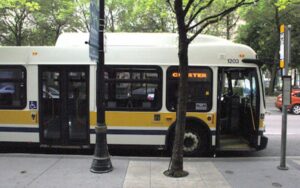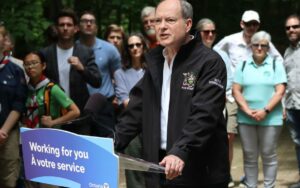
It’s not the first time the courses have been subject to council review. Some argue that they are barely making any money, sometimes even posting deep losses, so it is better to get rid of at least some of them in favour of public park space. Pictured is the city’s Chedoke Golf Course. Photo credit: Tourism Hamilton
The City of Hamilton owns three golf courses, the futures of which will be reviewed thanks to a motion approved by City Council.
Hamilton’s Chedoke Golf Course is home to the Martin and Beddoe courses, each with 18 holes for a total of 36.
King’s Forest Golf Course in the Red Hill Valley has another 18 holes.
Chedoke opened in 1896 as the Hamilton Golf Club, while King’s Forest began operation in 1974.
Ward 1 (Chedoke-Cootes) Councillor Maureen Wilson called for a review of all three courses.
She wants to examine whether or not they can be converted, at least in part, to more public greenspace, specifically the Chedoke course lands which are in her ward.
The review will examine financial figures, membership, and the current environmental impact of the courses.
Some question why the city is in the golf business at all.
But it’s not the first time that the golf courses have been reviewed.
The city hired a consultant in 2016 to study the courses in an effort to improve revenues.
That included the possibility of switching course operation to the private sector and even the potential for selling some of the land for housing.
In the end, in 2017, the city decided to keep everything as-is with Hamilton residents voicing opposition to both ideas, not wanting private sector takeover or development on the land.
Just six years later, and the city is set for another review.
At the same time, even if golf course land was sold for housing purposes, both properties are located in a heavily restricted area at the base of the Niagara Escarpment.
It’s unclear if housing developments would be permitted on the land due to environmental concerns.
As far as Chedoke is concerned, with its 36 holes there are certainly questions about whether all 36 are truly necessary.
Some also argue that if the city converts some of the green space to a park that would mean less opportunity for the city to attract much-needed revenue through the golf courses.
Others argue that the courses are barely making any money, sometimes even posting deep losses, so it is better to get rid of at least some of them in favour of a public park.
For example, the clubhouse at Chedoke is over 60 years old. The city has previously shelled out money for repairs and will inevitably have to spend more on the building to continue golf operations.
Between 2017 and 2022 Chedoke generated $41,836 in profit. The course lost $195,570 in 2019, but finished $406,066 in the black in 2020.
Pandemic lockdowns ended up helping the course since there was a time period where indoor recreation options and restaurants were all closed, but outdoor recreation was permitted.
Meanwhile, King’s Forest lost $460,367 over the same time frame. Large losses in 2017, 2018, 2019, and 2021 (each well over $100,000) were followed by a $190,935 profit in 2022.
Nevertheless, it remains to be seen what the staff report will detail and suggest, including whether the courses are projected to be profitable over the next few years.
Set in motion by Councillor Wilson’s proposal, the report is expected in early 2024.

Based in Hamilton, he reaches hundreds of thousands of people monthly on Facebook, Instagram, TikTok, and Twitter. He has been published in The Hamilton Spectator, Stoney Creek News, and Bay Observer. He has also been a segment host with Cable 14 Hamilton. In 2017, he received the Chancellor Full Tuition Scholarship from the University of Ottawa (BA, 2022). He has also received the Governor General’s Academic Medal. He formerly worked in a non-partisan role on Parliament Hill in Ottawa.


















